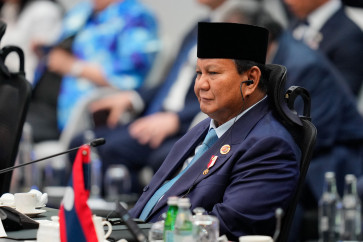Popular Reads
Top Results
Can't find what you're looking for?
View all search resultsPopular Reads
Top Results
Can't find what you're looking for?
View all search resultsA plastic shopping bag tax: One way to tackle waste?
Plastic waste is a huge problem
Change text size
Gift Premium Articles
to Anyone
P
lastic waste is a huge problem. It is very difficult for it to decompose naturally and when it burns, it releases toxins such as dioxins and polycyclic aromatic hydrocarbons that are very harmful for the environment and human health. These toxins are linked to the development of cancer.
Animals also suffer when they ingest plastic. According to the Environment and Forestry Ministry, the use of plastic bags in Indonesia over the past 10 years has increased. In the past decade, Indonesians used approximately 9.8 billion sheets of plastic bags per year and almost 95 percent of these bags ended up as waste.
Based on a recent study published in Science Magazine by Jenna R. Jambeck, Indonesia ranked second after China in terms of mismanaged plastic waste.
In order to handle the growing problem in Indonesia, a new plastic shopping bag tax will be imposed on a trial basis. The policy is geared for consumers shopping in modern markets and retail outlets and will be imposed from Feb. 21, on National Waste Awareness Day, to June 5, the date of World Environment Day. At the completion of the trial phase, the regulatory framework is expected to be completed by June 2016.
The local governments of 23 cities such as Ambon in Maluku, Bandung, Bekasi, Depok in West Java, Jakarta, Medan, North Sumatra and Jayapura have shown an interest in participating in this movement. The ministry has proposed a charge of Rp 500 (4 US cents) per bag. Of this amount, Rp 200 will be repaid to consumers who return the plastic bags to the retailers and the rest will be used by retailers and the local municipality to fund environmental activities. However, the price could range between Rp 500 and Rp 5,000, depending on the local policy.
Several countries have already introduced this policy, such as Taiwan, Ireland, Hong Kong, Botswana, China and Denmark.
There are different approaches. A tax on plastic shopping bags can be imposed to discourage consumers from using plastic bags, which will decrease litter and reduce the volume of waste going to the landfill. The tax can encourage them to bring their own bag. Ireland applies this type of tax. The ministry seems to be proposing a similar tax combined with the deposit-refund system. This system means that when a potentially polluting product is sold, a deposit should be charged simultaneously.
Thus, the deposit will be refunded when consumers return empty containers to collection points. It is similar to the 'bottle bill' in the US; consumers pay a deposit when they purchase beverages in bottles and they are refunded when they return empty bottles to retailers or designated collections points. One of the objectives of the deposit-refund system is to prevent improper waste disposal.
Another approach is imposing a Pigouvian tax. Named after the British university professor Arthur Cecil Pigou, who coined the theory, the tax aims to internalize the external cost of using plastic bags. The external cost is the environmental cost that includes pollution, waste problems, and damage to wildlife.
To implement this type of tax, we calculate the margin of the external cost and determine the optimum level of the tax accordingly. This is also a way to reduce pollution and protect the environment by discouraging excessive consumption of plastic bags.
This policy reflects the polluter-pays principle, meaning those who cause pollution should bear the cost of managing it.
To enact an effective policy, there are several issues that need to be addressed. First, there should be clarity regarding at what level the tax applies, whether it is the upstream (manufacturers, importers) or downstream (the point of sale) level. Denmark introduced green taxes, which include the plastic bag tax, at the upstream level.
The importers and manufacturers have to pay the tax according to the weight of plastic bags. Thus, when the retailers purchase plastic bags from the manufacturers, the price is already loaded with the tax.
The retailers are not obligated to convey the tax to the costumers. Nevertheless, some retailers such as supermarkets use the tax as a way to charge consumers for plastic bags. On the other hand, if the tax applies downstream, it should be clear which points of sale are targeted. In Taiwan, the 2002 restricted use policy on plastic shopping bags specifies the places and types of retailers, such as government departments and agencies, schools, public hospitals, department stores, shopping malls, warehouse stores, supermarkets, and convenience stores, that are subject to the policy.
Second, there should be clarity related to the type of plastic subject to charge. Hong Kong includes all plastic shopping bags that are made wholly or partially of plastic to be charged. Ireland imposes the tax on both non-biodegradable and biodegradable plastic shopping bags but offers an exception for a few types of bags.
Third, there should be accountability on how the money is collected and managed. Both government and retailers should maintain good records on the number of plastic bags procured by retailers, the number of bags provided to consumers and the amount charged by retailers to consumers.
In Hong Kong, there are specific instructions for the registered retailers regarding the total payment of taxes from the consumers to the government. In Ireland, the collected taxes paid by the consumers are designated for the environmental fund. This also prevents the retailers from taking excessive profits from this scheme.
If Indonesia wants to apply the deposit-refund system, the mechanism should be clear. Consumers need to know, for example, how they get repaid when they return the plastic bags to the retailers, and whether they should bring the payment receipt. It must be clear whether the retailers will accept any kind of plastic bags to be refunded or only specific bags from their own stores. It is also important that the mechanism be easy to implement.
Fourth, there must be public involvement in this environmental initiative. It will be effective if all stakeholders, including customers, suppliers of goods and services, retailers and the government, are willing to fully participate. The customers should be aware that they play a critical role in protecting the environment by consistently reducing their use of shopping bags.
The retailers, represented by the cashiers, need to be informed prior to the implementation of this policy to enable them to deal effectively with the customers. The government must keep educating the public, and provide a space for dialogue and access for the public to participate in the decision-making process.
This way, the policy can hopefully reach the desired goal.
__________________
The writer is a researcher at the Center for Regulation, Policy and Governance. She graduated from the Centre for Energy, Petroleum and Mineral Law and Policy, University of Dundee, UK.










